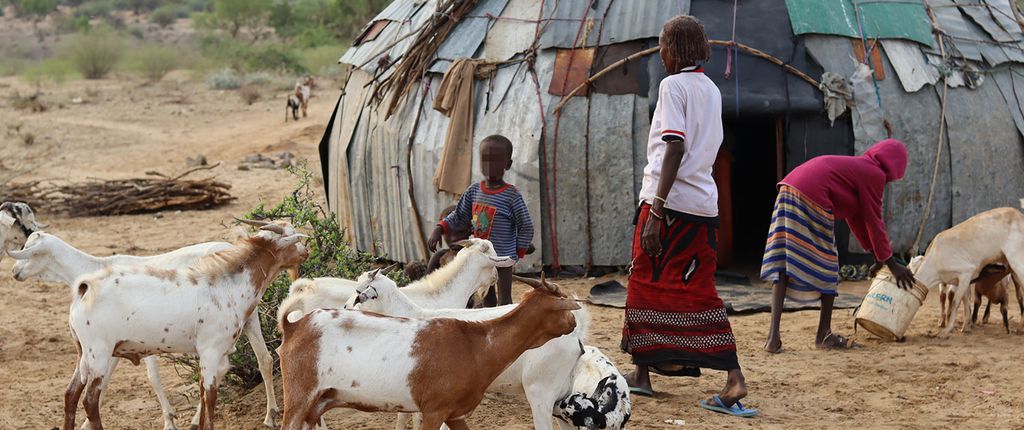
One Health approach to build resilience of semi-nomadic populations in the border region of Kenya and Ethiopia
Humans, animals and the environment. The interrelationship and interchange between these three areas have a critical impact on global health. Many infectious diseases originate from wildlife, and their emergence and spread are further fueled by ecological conditions and climate change. Human interventions in the ever-shrinking habitat of wild animals, or even livestock farming, further increase the risk that pathogens will spread rapidly and afflict humans.
To mitigate this risk and prevent the emergence of new infectious diseases, the link between human, animal and environmental health must be considered comprehensively. This is achieved by "One Health" - an interdisciplinary and holistic approach that recognizes human health, animal health and the environment as an interconnected system and aims to improve and strengthen them. All relevant interfaces are taken into account, and the stakeholders from various fields of expertise are brought together.
In northern Kenya and southern Ethiopia, we are implementing a cross-border One Health project to reduce the spread of zoonotic diseases in arid and semi-arid lands (ASALs) and thus improve the resilience of people - especially pastoralists who are suffering greatly from the effects of climate change. This process shall promote sustainable livelihoods and the healthy coexistence of people and animals in an intact ecosystem.
In the arid and semi-arid south of Ethiopia and north of Kenya, humans, animals and the environment are struggling with multiple crises. Especially for the semi-nomadic groups of the Gabbra and the Borena in our project areas Maikona Ward (North Horr Sub-County, Marsabit County, Kenya) and Dire Woreda (Borena Zone in the Oromiya Region, Ethiopia), who make their living with cattle breeding, the situation is increasingly difficult.
Due to prolonged droughts – exacerbated by climate change – large areas are affected by water shortages and lack of grazing land. This leads to unusual migration of livestock and thus to potential conflicts over natural resources and land. The spread of infectious diseases and the transmission of zoonotic diseases are also facilitated by the increased migration of herds. Information on zoonotic diseases and other diseases is scarce, and health stations for both humans and animals are mostly undersupplied. Essential medicines and vaccines are not available. Capacity and resources of medical staff for humans and livestock are limited. This has dangerous consequences, including the spread of zoonotic diseases such as brucellosis and rabies, and other communicable diseases. Agriculture has also become almost impossible: Persistent droughts on the one hand and occasional floods on the other have eroded the nutrient-rich soil. The growing population, along with increasing livestock, are adding even more pressure to already stressed ecosystems. These accumulated shocks and demands threaten people's lives and livelihoods exponentially.
At the national level, guidelines on the One Health approach already exist, but the concrete transfer of knowledge and a sustainable development of corresponding structures in the regions is not yet very developed. In addition, there is no coordination and linkage of the relevant One Health sectors to effectively address the situation. The capacities of the individual health structures (veterinary and human) are limited, and research on One Health is still relatively new.
Our program contributes to the improvement of human, animal and environmental health in Northern Kenya and Southern Ethiopia.
The project aims to reduce morbidity from zoonotic infections through a multi-sectoral One Health approach and interventions in Maikona Ward (North Horr Sub-County, Marsabit County, Kenya) and Dire Woreda (Borena Zone in Oromiya Region), Ethiopia.
The program has the following sub-goals:
- Strengthened and established One Health systems and structures that can respond to zoonotic diseases and epidemics in a coordinated and appropriate manner.
- Improved human, livestock, and environmental health, through control and prevention of zoonotic diseases, increased food security, and WASH practices.
- Integration of One Health research components and establishment of two sustainable model farms for training, research, and best practices in both regions.
- Establish and strengthen One Health structures in Marsabit (Kenya) and Dirre Woreda (Ethiopia) to improve reporting and tracking of disease outbreaks through an emergency operations center and One Health teams.
- Training and education of One Health staff from local authorities and partners in the areas of One Health, zoonotic diseases, communication, and support for intersectoral coordination.
- Increase linkage of regional operation centers to the national level, including to ILRI (International Livestock Research Institute), for comprehensive disease outbreak investigation and research.
- Improve food security through adapted farming practices and training on diversified diets.
- Raise awareness on hygiene practices, improved food preparation, and transmission of diseases and zoonotic diseases.
- Conduct mobile health services, both animal and human, to improve overall health care, including vaccination campaigns.
- Integrate One Health research components to better understand livelihoods, human-animal-environment interfaces, and available training content.
- Establish two sustainable model farms as examples of improved drought resilience, for trainings, research (ILRI) and sharing of best practices in both regions.
Project data
Donors: German Federal Foreign Office, Merck Family Foundation, Germany's Relief Coalition (Aktion Deutschland Hilft), Malteser International
Partners: Pastoralist Community Initiative and Development Assistance (PACIDA), International Livestock Research Institute (ILRI)








